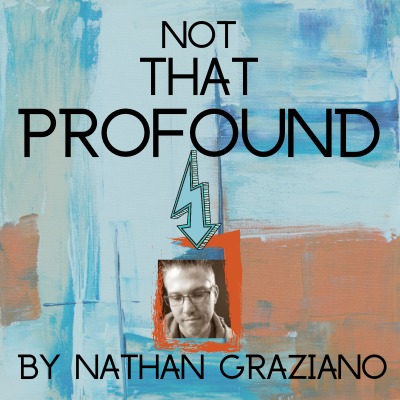
 This is not Nate Graziano writing this column. This is an Artificial Intelligence bot prompted by ChatGPT to compose a column in the voice and style of Nate Graziano.
This is not Nate Graziano writing this column. This is an Artificial Intelligence bot prompted by ChatGPT to compose a column in the voice and style of Nate Graziano.
While I could tell you that this is actually Nate Graziano writing this, how can you be sure these days? Without sitting beside me at my desk and watching me type these words on the keypad, it is becoming ever more difficult to ascertain that anything language-based has been wholly constructed by a sentient human being.
Since ChatGPT and other AI apps have become readily available—some for free, the better ones charging service fees—it’s become a confounding task to prove plagiarism, as I’m sure many of my fellow-educators can attest.
Meanwhile, AI is also replacing romantic relationships for some people [1]. There are growing incidents of people falling in love with their AI-powered chatbots then growing frustrated when the bots reject their sexual advances.
And these somewhat innocuous examples of AI intervening in human lives are sitting at the shore of an ocean full of technological tides that threaten to reshape our world and species—sooner rather than later.
There’s a term for the aforementioned change that is currently occurring in its nascent stages: It’s called The Singularity, and it is important to remember that this is not science fiction.
In his 2015 book “Sapiens: A Brief History of Humankind,” author and historian Dr. Yuval Noah Harari describes The Singularity as the point “when all the concepts that give meaning to our world—me, you, men, women, love and hate—will become irrelevant.”
Some scientists are calling The Singularity a second Big Bang.
And this can be a vastly daunting and uncomfortable topic for humans to entertain because it involves such an unfathomable existential shift in the ways we define consciousness and existence. In fact, my wife refuses to discuss the topic with me, preferring to remain blissfully ignorant to the idea that after 70,000 years, the homo sapien species is likely on its last leg.
As we speak, scientists are nearing the point where they will completely reverse-engineer the human brain—a conservative estimate is currently 2030—at which point, all bets are off.
For example, we could conceivably scan our minds onto hard drives, becoming immortal and creating an existence unrecognizable to the one we know now in 2023.
All of this begs loftier philosophical and ethical questions. What makes us human? Can the human spirit and consciousness be digitally replicated? Will any of this even matter as the technology we’ve created takes off on its own, independent of its human creators?
Harari writes that the “future Dr. Frankensteins could therefore create something truly superior to us, something that will look at us as condescendingly as we look at the Neanderthals.”
All of this stuff is far headier than the typical fart-jokes, baseball boners and midlife gripes that ninny Nate Graziano usually tackles in his column.
So maybe this is not Nate Graziano writing after all, and the AI author doesn’t need a taco, bitches.
________
[1] The first documented romance between man and robot actually occurred in 1985 when Paulie fell in love with his birthday gift in “Rocky IV.”







